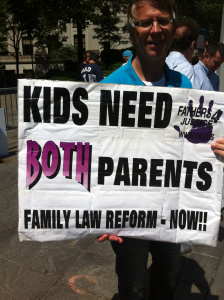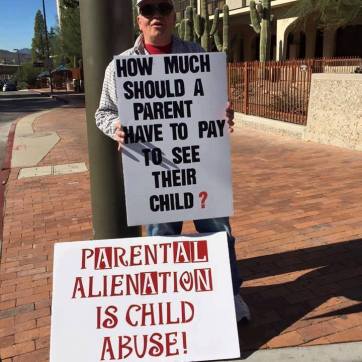It would seem that maintaining the father’s love and authority would be crucial when a child’s life is turned upside down by divorce. Yet, family courts routinely deprive children of one parent, usually the father, restricting his time with his child to about six days a month.
The courts pompously assert they are invoking "the best interest of the child," but how can it be in the best interest of children to make them forfeit one parent?
We hear many pious comments about the need for fathers to be involved in the upbringing of their children. This need should be even more important in times of emotional stress, such as divorce, than the need for fathers to play ball with their kids in an intact family.
Some states are considering legislation that establishes a presumption of shared parenting whereby divorced parents divide equally both time and authority over the children. This enables children to maintain strong ties to both parents.
 When primary or sole custody is given to the mother, the father becomes merely a visitor in the child’s life (that’s why it’s called "visitation"), whose only value is to mail a paycheck and be an occasional baby sitter. The father loses his parental authority and fades out of his own child’s life.
When primary or sole custody is given to the mother, the father becomes merely a visitor in the child’s life (that’s why it’s called "visitation"), whose only value is to mail a paycheck and be an occasional baby sitter. The father loses his parental authority and fades out of his own child’s life.
An argument is sometimes made that shuttling back and forth between two homes might be upsetting or a nuisance, but there is no more shuttling with equal custody (where parents, for example, get alternating weeks) than with the typical mother-custody/father-visitation schedule (where the father gets two weekends a month plus some Wednesday evenings). Do the math; both plans have about the same number of shuttles between homes.
An argument is also made that giving custody primarily to the mother promotes stability, but the need for stability is really a reason for shared custody. The stability of parental relationships is a great deal more important than contact with material things.
 Americans have always assumed that parents share decision-making authority because only parents can determine what is in the best interest of their own children. As recently as 2000, the Supreme Court in Troxel v. Granville reaffirmed this principle and rejected the argument that a judge could supersede a fit parent’s judgment about his child’s "best interest."
Americans have always assumed that parents share decision-making authority because only parents can determine what is in the best interest of their own children. As recently as 2000, the Supreme Court in Troxel v. Granville reaffirmed this principle and rejected the argument that a judge could supersede a fit parent’s judgment about his child’s "best interest." Nevertheless, in what Stephen Baskerville calls a "silent revolution," millions of divorced parents have had their fundamental right to decide what is in the best interest of their own children taken away and given instead to a vast array of government officials and so-called "experts" such as judges, lawyers, psychologists, psychiatrists, social workers, child protective services, child support enforcement agents, mediators, counselors, parenting classes, and feminist groups.
Nevertheless, in what Stephen Baskerville calls a "silent revolution," millions of divorced parents have had their fundamental right to decide what is in the best interest of their own children taken away and given instead to a vast array of government officials and so-called "experts" such as judges, lawyers, psychologists, psychiatrists, social workers, child protective services, child support enforcement agents, mediators, counselors, parenting classes, and feminist groups. This shift began in the 1970s after the spread of unilateral divorce was followed by the creation of a giant federal child support-enforcement bureaucracy. The notion that this mix of government officials and government-appointed advisers can dictate what is the best interest of the child rather than a child’s own parents is how liberals and feminists are fulfilling their goal that "it takes a village (i.e., the government) to raise a child."
This shift began in the 1970s after the spread of unilateral divorce was followed by the creation of a giant federal child support-enforcement bureaucracy. The notion that this mix of government officials and government-appointed advisers can dictate what is the best interest of the child rather than a child’s own parents is how liberals and feminists are fulfilling their goal that "it takes a village (i.e., the government) to raise a child."An example of the bias against fathers can be seen in the Responsible Fatherhood Act of 2007 recently introduced by Sens. Barack Obama, D-Ill., and Evan Bayh, D-Ind. The bill mentions "child support" 65 times, but not once does it mention parenting time, custody, visitation, or access denial.
 Baskerville’s new book, "Taken into Custody: The War Against Fatherhood, Marriage, and the Family" (Cumberland House, $24.95), provides a copiously documented description of society’s injustices to children who have been deprived of their fathers and of fathers who have been deprived of their children. This book is a tremendous and much-needed report on how family courts and government policies are harming children.
Baskerville’s new book, "Taken into Custody: The War Against Fatherhood, Marriage, and the Family" (Cumberland House, $24.95), provides a copiously documented description of society’s injustices to children who have been deprived of their fathers and of fathers who have been deprived of their children. This book is a tremendous and much-needed report on how family courts and government policies are harming children.
It is a breakthrough for shared parenting that a noncustodial father, Robert Pedersen, was recently named runner-up in the nationwide Best Life Magazine’s "Hero Dad" Contest. Pedersen is only allowed 6 to 8 days a month with his two children from a previous marriage.
 Debates about same-sex marriage and gay adoptions always include the argument that a child has the right to both a father and a mother. If that is true, why is a child usually deprived of that right when heterosexual couples divorce?
Debates about same-sex marriage and gay adoptions always include the argument that a child has the right to both a father and a mother. If that is true, why is a child usually deprived of that right when heterosexual couples divorce?
Debates about same-sex marriage and gay adoptions always include the argument that a child has the right to both a...
Posted by Boycottfamilylaw : Restore Children's Rights Worldwide on Wednesday, September 23, 2015
Think about it
Posted by Monica White on Tuesday, August 11, 2015

#StandupforZoraya
Posted by Children's Rights on Friday, July 31, 2015
Posted by Jyoti Prakash Haldar on Saturday, September 5, 2015
PETITION TO: Florida 11th Judicial Circuit Chief Honorable Judge SotoAt the time of starting this petition, I have not...
Posted by Childrens Rights Florida on Monday, August 17, 2015
Children's Rights: #StandupforZoraya http://bit.ly/1DYV1XS
Posted by American Fathers Liberation Army on Monday, August 24, 2015
https://www.causes.com/campaigns/44302-stand-up-for-zoraya
Posted by American Fathers Liberation Army on Saturday, June 27, 2015
HAPPY BIRTHDAY!
"Few human rights abuses are so widely condemned, yet so widely practiced. Let us make (children a priority. Because a...
Posted by Children's Rights on Thursday, June 11, 2015



































Fathers have become undervalued, family structure has become disposable, children suffer without both parents but so often father is left out, seen as nonessential. Let's correct this by bringing attention to it! We're happy to populate the Internet with information that is helpful, supportive, and conducive to fostering father-child relationships, reducing or eliminating Parental Alienation, for the betterment of our children's psychological and emotional health, and for the future health of our families and societies
ReplyDelete